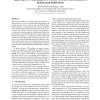Free Online Productivity Tools
i2Speak
i2Symbol
i2OCR
iTex2Img
iWeb2Print
iWeb2Shot
i2Type
iPdf2Split
iPdf2Merge
i2Bopomofo
i2Arabic
i2Style
i2Image
i2PDF
iLatex2Rtf
Sci2ools
132
click to vote
MOBISYS
2005
ACM
2005
ACM
Improving TCP performance over wireless networks with collaborative multi-homed mobile hosts
Multi-homed mobile hosts situated in physical proximity may spontaneously team up to run high-bandwidth applications by pooling their low wireless wide-area network (WWAN) bandwidths together for communication with a remote application server and utilizing their high-bandwidth wireless local-area network (WLAN) in ad-hoc mode for aggregation and distribution of application contents among the participating mobile hosts. In this paper, we first describe the need for such a mobile collaborative community, or a community, in which multi-homed mobile hosts exploit the diversity of WWAN connections to improve a user-perceived bandwidth and network utilization. Then, we show that existing one-to-one communication protocols like TCP suffer significant performance degradation due to frequent packet reordering and heterogeneity of WWAN links in the community. To address the above TCP problem, we propose a proxybased inverse multiplexer, called PRISM, that enables TCP to efficiently utilize the ...
MOBISYS 2005 | Multi-homed Mobile Hosts | Multiple Wwan Links | Wireless Networks | WWAN Connections |
Related Content
| Added | 24 Dec 2009 |
| Updated | 24 Dec 2009 |
| Type | Conference |
| Year | 2005 |
| Where | MOBISYS |
| Authors | Kyu-Han Kim, Kang G. Shin |
Comments (0)

